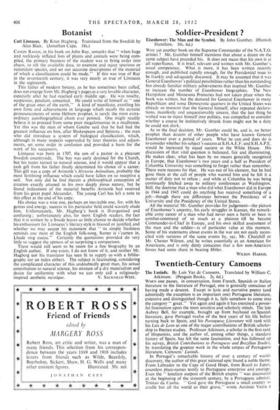Soldier-President ?
WHY yet another book on the Supreme Commander of the N.A.T.O. armies ? Mr. Gunther himself mentions that about a dozen on the same subject have preceded his. It does not mean that his own is at all superfluous. It is brief, relevant and written with Mr. Gunther's usual competence. What is more, it has been written recently enough, and published rapidly enough, for the Presidential issue to be frankly and adequately discussed. It may be assumed that it was General Eisenhower 's political possibilities rather than his outstanding but already familiar military achievements that inspired Mr. Gunther to increase the number of Eisenhower biographies. The New Hampshire and Minnesota Primaries had not taken place when the book was written, but the demand for General Eisenhower in many Republican and some Democratic quarters in the United States was already so insistent that the General himself, after repeated declara- tions, manifestly and unquestionably sincere, that the last thing he wished was to inject himself into politics, was compelled to consider whether a course he instinctively shrank from might not be a duty he could not shirk.
As to the final decision, Mr. Gunther could be, and is, no better prophet than dozens of other people who have known General Eisenhower over a period of years. What he can,and does do is to consider whether his subject's success at S.H.A.E.F. and S.H.A.P.E. would be increased by equal success at the White House. His discussion of that vital question is balanced, fair and illuminating. He makes clear, what has been by no means generally recognised in Europe, that Eisenhower's two years and a half as President of Columbia University was something to forget rather than remember. There were reasons for that. He was out of his element, but he had gone there at the call of people who wanted him and he felt it a matter of duty not to refuse ; and while at Columbia he was being continually fetched away to military conferences at Washington. Still, the doctrine that a man who did what Eisenhower did in Europe in 1944 and 1945 could do anything has received something of a jolt—though there are differences between the Presidency of a University and the Presidency of the United States.
All the material Mr. Gunther provides for judgement—the picture of Eisenhower's ancestry, his early struggles in Kansas, the remark- able army career of a man who had never seen a battle or been in combat-command of so much as a platoon till he became Commander-in-Chief in Europe, and his own skilled assessment of the man and the soldier—is of particular value at this moment. Some of his statements about events in the war are not easily recon- ciled with versions of the same events by, say, Mr. Churchill or Mr. Chester Wilmot, and he writes essentially as an American for Americans, and is only dimly conscious that a few non-American forces had some share in beating Hitler.
WILSON HARRIS.


































 Previous page
Previous page